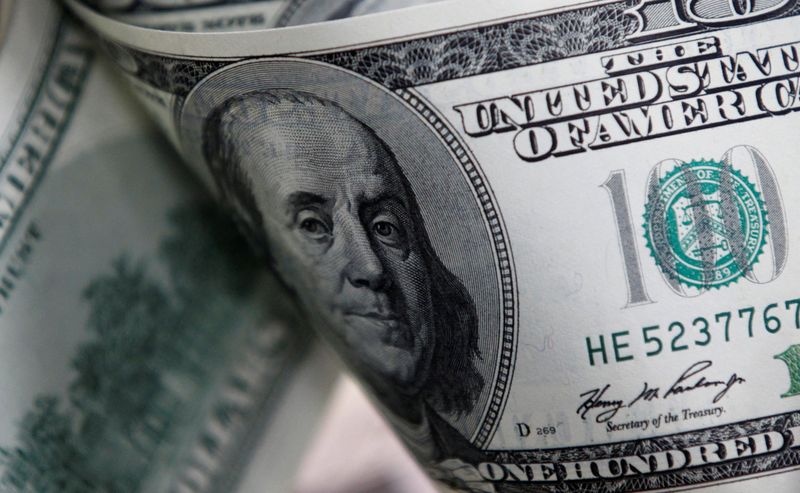Analysis-Trump’s win emboldens dollar bulls as they brace for tariffs
2024.11.07 01:35
By Saqib Iqbal Ahmed
NEW YORK (Reuters) – Donald Trump’s imminent return to the White House is putting a spotlight on the U.S. dollar, which could have far-reaching implications for everything from domestic manufacturers to emerging markets if the currency’s rally continues.
The U.S. currency notched its biggest one-day gain against its peers in eight years on Wednesday, one day after Trump was re-elected president and Republicans won control of the Senate while making gains in the House of Representatives. The dollar is up 3.8% this year and stands at its highest level in four months.
How much further the dollar climbs could hinge on whether investors believe Trump will enact the tax cuts and tariffs that are key elements of his economic platform. While those policies could boost growth, they risk ramping up inflation and could keep U.S. interest rates far above those of other countries. Higher rates raise the dollar’s allure to investors.
At the same time, a strong dollar could hurt U.S. companies – one reason why the president-elect periodically railed against a rising dollar during his first term.
“A Trump administration likely means more spending, a hotter economy and high bars for international trade – all things that spell strength for the dollar,” said Helen Given, associate director of trading at Monex USA.
RATES TRAJECTORY
The path of interest rates is key to the dollar’s future prospects. The Federal Reserve kicked off its most recent monetary easing cycle with a 50-basis-point rate cut in September and is expected to announce a 25-basis-point reduction at the conclusion of this week’s two-day monetary policy meeting on Thursday.
Expectations of rate cuts helped weaken the dollar earlier this year.
But prospects of heightened inflation could make policymakers wary of overheating the economy by cutting rates too deeply. Traders on Wednesday trimmed bets on how much the Fed would lower rates next year to about 42 basis points, from 62 basis points last month, based on LSEG’s calculations.
“I would describe this as a tectonic shift in currency markets,” said Paresh Upadhyaya, director of fixed-income and currency strategy at Amundi US. Investors now “have to take into account trade tariffs and the implications it will have on the U.S. inflation outlook, on the global growth outlook and … how the Fed will react to it.”
A so-called Red Sweep scenario in which Republicans control the White House and both houses of Congress could make it easier for Trump to enact tax cuts and give Republicans more leeway for their economic agenda.
While Republicans were set to hold a majority of at least 52-48 in the U.S. Senate, final control of the lower chamber was yet unclear, with vote counting still underway.
Brad Bechtel, global head of FX at Jefferies, believes the dollar could gain another 5% in a Red Sweep scenario and advance further in coming months as more of Trump’s agenda is enacted.
Trump will be inaugurated on Jan. 20.
In 2016, the dollar rose about 6% against a basket of currencies in the first two months after Trump’s election victory but gave up those gains in subsequent months. The dollar went on to rally about 13% between February 2018 and February 2020 when Trump implemented tariffs against several countries, including China and Mexico.
RIPPLE EFFECTS
A rising dollar could be a double-edged sword for the U.S. economy, helping tamp down inflation while hurting the competitiveness of American products abroad. It could also pressure the profits of multinational U.S. companies that need to convert their foreign profits into dollars.
A study by JPMorgan found that every 2% increase in the trade-weighted dollar shaves 1% from earnings growth, according to strategists at JPMorgan.
Should a rising dollar become a headwind for growth, Trump might exhort the Fed to cut interest rates or push U.S. trading partners to boost their own currencies.
Trump could also employ the Exchange Stabilization Fund, which was created in the 1930s as a tool for stabilizing the exchange rate and now has about $215 billion. Trump did not use the fund during his first term, and analysts are skeptical of how effective such a measure would be in reining in the dollar without a global effort or support from the Fed.
“Trump’s preference for a weaker dollar would have to be accommodated by and in coordination with the Federal Reserve, which we view as unlikely,” analysts at Wells Fargo (NYSE:) wrote in a Wednesday report.
Given the dollar’s role as a linchpin of the global financial system, persistent strength in the U.S. currency could ripple out to other assets.
A strong dollar could be particularly unwelcome for emerging market countries, especially nations that have borrowed heavily in the U.S currency since a rising dollar would make it more difficult for them to repay their debts.
That could pressure central banks in those countries – as well as some developed countries such as Japan – to hike rates in an effort to defend their own currencies, said Bechtel, of Jefferies.
“You’re going to enter this new regime of currency war that used to flare up from time to time in the past,” he said.
Some investors believe tariffs could eventually end up hurting the U.S. economy, because they can increase costs for businesses and consumers, disrupt supply chains and reduce trade volumes. All that could reduce the prospects for dollar strength down the road.

A study by Deutsche Bank (ETR:) said tariffs would subtract about a quarter of a point from U.S gross domestic product if implemented.
“The reality is that a full flight protectionist agenda will ultimately rebound on the American economy and slow growth,” said Karl Schamotta, chief market strategist at payments company Corpay.








